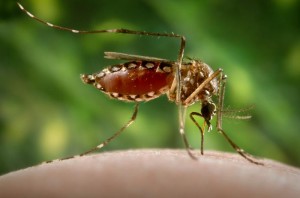Caribbean Chikungunya outbreak tops 100 cases
Since the first cases of locally acquired chikungunya fever were detected in the Americas (the French side of Saint Martin) in early December 2013, the case count has blossomed to 111 confirmed cases, according to a European Centre for Disease Prevention and Control (ECDC) update today.

Aedes aegypti
Image/CDC
This total is up from 71 confirmed cases reported about one week ago.
The total case counts as of Dec. 31 for the following Caribbean islands are as follows: Saint Martin (FR) now has 89 PCR-confirmed cases and 20 IgM-positive cases (probable cases).
Saint Martin, Dutch side has reported one confirmed case.
The island of Martinique has recorded eight confirmed cases, while French Guyana has reported one confirmed case imported from Martinique.
Guadeloupe has reported three confirmed cases and Saint Barthélemy has confirmed nine, with one of the confirmed cases originating in Martinique.
LISTEN: Chikungunya in the Western Hemisphere: An interview with a CDC expert
According to the World Health Organization, chikungunya is a mosquito-borne viral disease first described during an outbreak in southern Tanzania in 1952. It is an alphavirus of the family Togaviridae. The name ‘chikungunya’ derives from word in the Kimakonde language, meaning “to become contorted” and describes the stooped appearance of sufferers with joint pain.
Chikungunya is characterized by an abrupt onset of fever frequently accompanied by joint pain. Other common signs and symptoms include muscle pain, headache, nausea, fatigue and rash. The joint pain is often very debilitating, but usually lasts for a a few days or may be prolonged to weeks.
Most patients recover fully, but in some cases joint pain may persist for several months, or even years. Occasional cases of eye, neurological and heart complications have been reported, as well as gastrointestinal complaints. Serious complications are not common, but in older people, the disease can contribute to the cause of death.
The virus is transmitted from human to human by the bites of infected female mosquitoes. Most commonly, the mosquitoes involved are Aedes aegypti and Aedes albopictus, two species which can also transmit other mosquito-borne viruses, including dengue.
There is no specific antiviral drug treatment for chikungunya. Treatment is directed primarily at relieving the symptoms, including the joint pain. There is no commercial chikungunya vaccine.
For more infectious disease news and information, visit and “like” the Infectious Disease News Facebook page and the Outbreak News This Week Radio Show page.
Looking for a job in health care? Check here to see what’s available
















[…] http://www.theglobaldispatch.com/caribbean-chikungunya-outbreak-tops-100-cases-60599/ […]
[…] Martin and others in the French Caribbean. The number of chikungunya cases confirmed on St. Martin has increased by nine as the total has reached 98, according to an Epidemiology report from the The French Institute for […]
[…] […]